Key takeaways:
- Recovery nutrition involves both physical and mental healing, emphasizing the importance of macronutrients like proteins, carbohydrates, and fats.
- Post-workout meals should be consumed within 30 to 60 minutes to maximize muscle recovery and energy restoration.
- Hydration and the incorporation of electrolytes are crucial for effective recovery and should not be overlooked.
- Listening to body cravings and adjusting meal timings based on needs can significantly enhance recovery experiences.
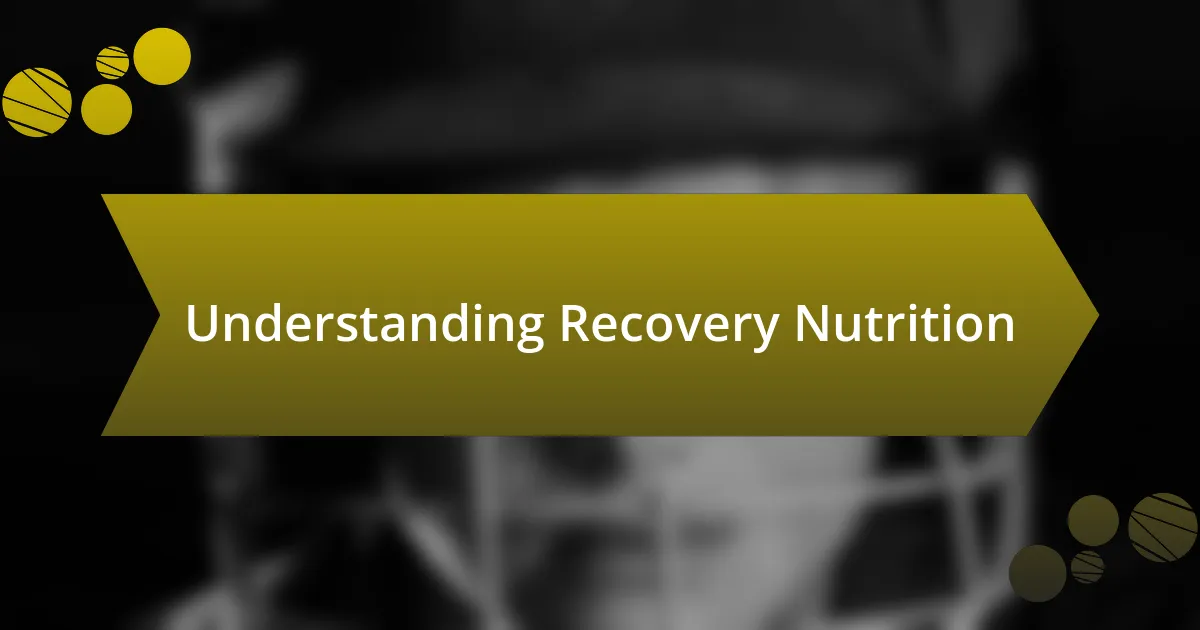
Understanding Recovery Nutrition
Recovery nutrition is not just about refueling the body; it’s about nurturing the mind as well. I remember a time after a particularly intense training cycle when I felt utterly depleted, both physically and mentally. That experience taught me that the right foods can play a significant role in improving my mood and mental clarity during recovery.
The science behind recovery nutrition emphasizes the importance of macronutrients—proteins, carbohydrates, and fats—working together for optimal healing. Have you ever thought about how the right blend of nutrients can affect your energy levels? I certainly have, and I found that a well-balanced recovery meal, rich in protein and carbohydrates, made a noticeable difference in my performance in the following days.
Listening to your body is crucial in recovery nutrition, as it often tells you what it needs. After some tough workouts, I learned to pay attention to cravings; they were my body’s way of signaling a need for replenishment. By honoring those cravings and adjusting my post-workout meals accordingly, I truly enhanced not only my recovery but also my overall well-being.
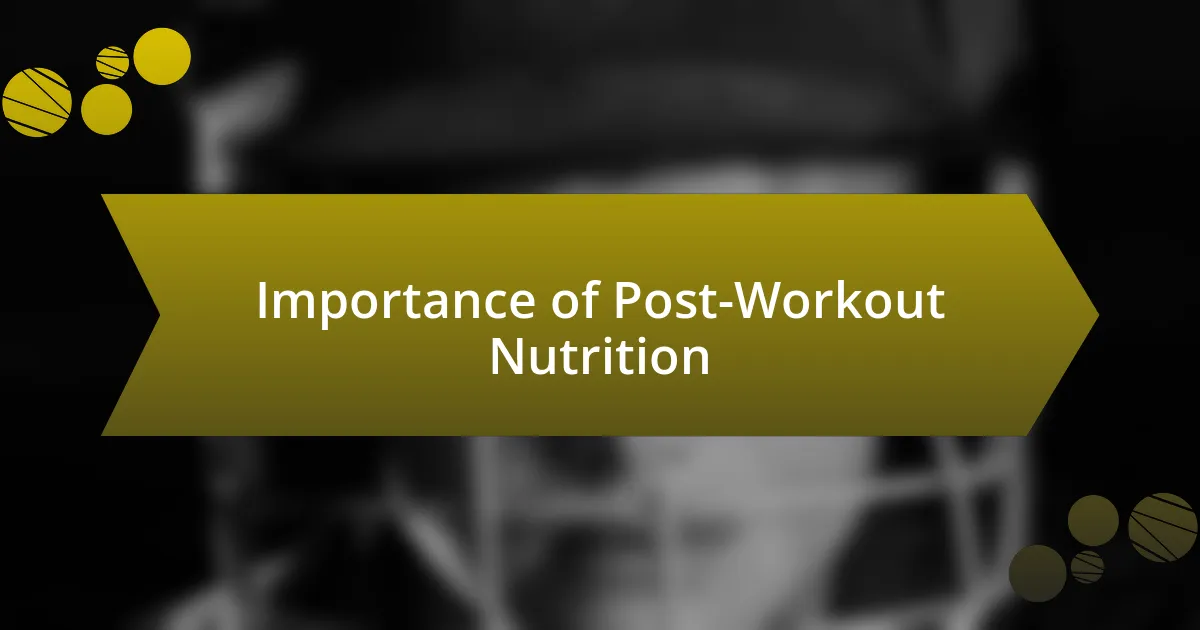
Importance of Post-Workout Nutrition
Post-workout nutrition plays a pivotal role in recovery, acting as the fuel your body needs to heal and grow stronger. I vividly recall after a grueling marathon training session, the overwhelming sense of fatigue that washed over me. I experimented with different post-workout meals, and it was amazing how a simple protein shake coupled with a banana rejuvenated my energy levels, allowing me to bounce back quicker than I imagined.
The timing of your post-workout meal can be equally instrumental. I’ve found that consuming the right nutrients within the first 30 to 60 minutes after my workouts made a world of difference. It’s like giving your body a jumpstart, and I noticed that my muscles felt less sore and more ready for the next challenge. Have you ever tried a recovery meal right after a workout? I highly recommend it; it’s a game-changer.
Furthermore, the psychological aspect of nutrition shouldn’t be underestimated. After intense workouts, I would often feel a sense of accomplishment; however, a poor post-workout meal could dampen my high spirits. On the other hand, treating myself to a nutritious meal not only fueled my body but also boosted my mood and motivation for the days ahead. It’s incredible how interconnected our physical and mental states are during recovery.
| Aspect | Importance |
|---|---|
| Muscle Recovery | Provides essential nutrients to repair muscle fibers |
| Energy Restoration | Replenishes glycogen stores for sustained performance |
| Mood Enhancement | Boosts mood and motivation through nutrient-rich choices |
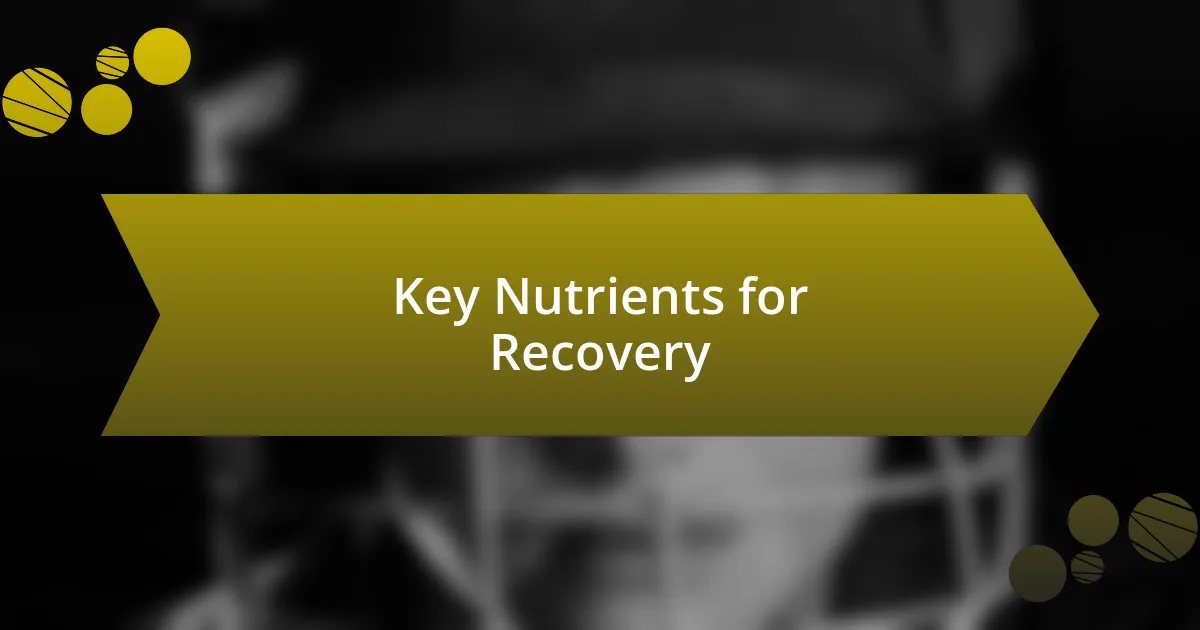
Key Nutrients for Recovery
When it comes to recovery, certain nutrients stand out as essential building blocks. In my experience, protein is a must-have after a workout. I remember one specific evening after an intense cycling session, I blended up a protein-rich smoothie with Greek yogurt and spinach. The satisfaction I felt as I sipped on that cool, nutrient-dense drink made me realize just how important it was for my muscle repair and overall recovery. It’s like giving your body the right tools to rebuild what you just pushed so hard.
Here are some key nutrients that should be prioritized for optimal recovery:
- Protein: Vital for repairing and rebuilding muscle tissues.
- Carbohydrates: Essential for replenishing glycogen stores, providing energy for future activities.
- Electrolytes: Important for rehydration, helping to restore balance after sweating.
- Omega-3 Fatty Acids: Beneficial for reducing inflammation and promoting heart health.
- Antioxidants: Found in fruits and vegetables, these help combat oxidative stress caused by intense training.
With these nutrients at the forefront of my recovery routine, I’ve experienced noticeable improvements in how I feel post-workout.
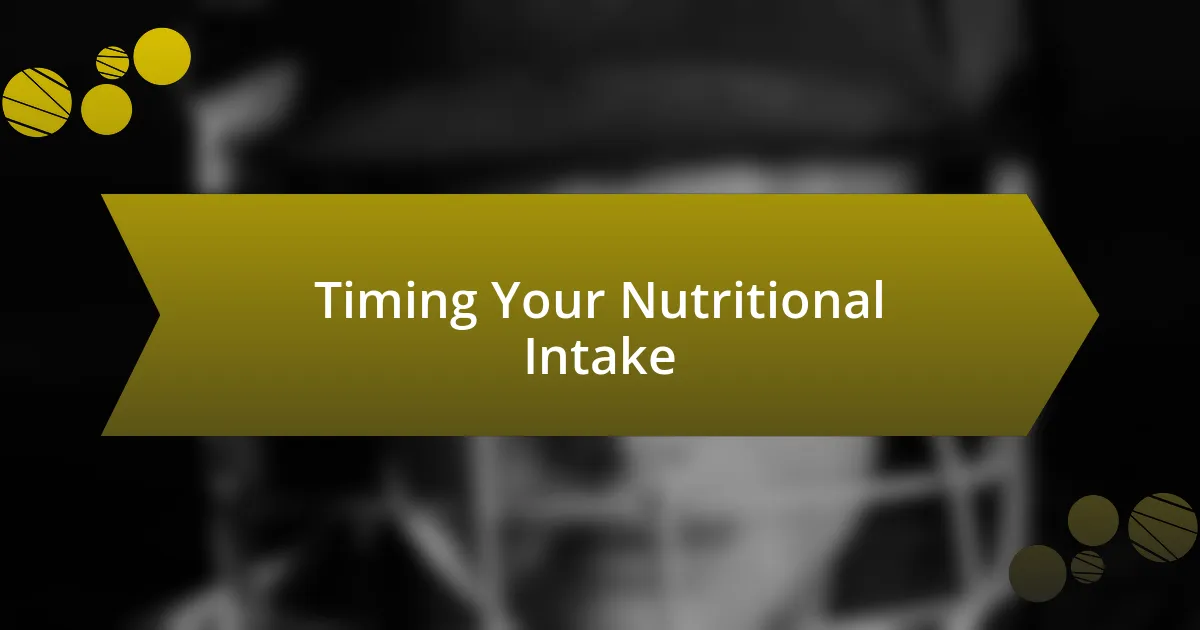
Timing Your Nutritional Intake
Timing your nutritional intake can make a significant difference in recovery. I’ve often wondered, “What’s the best time to fuel my body after a workout?” From my experience, eating within 30 minutes post-exercise is key. This window allows my body to absorb nutrients more effectively, kickstarting the repair process right when it needs it most.
I recall a particular day when I finished a heavy lifting session and rushed to have a balanced meal. It was grilled chicken with sweet potatoes and a side of greens. Just knowing that I was nourishing my muscles right after my workout provided a sense of accomplishment. It felt like I was actively participating in my recovery instead of just hoping for the best.
Furthermore, I’ve learned that spreading my meals throughout the day can help sustain energy levels during recovery. I try to have smaller, balanced meals every few hours rather than huge portions. This approach has helped me maintain a steady flow of nutrients, preventing sluggishness and promoting a quicker return to my workouts. Have you tried timing your meals like this? I can’t recommend it enough.
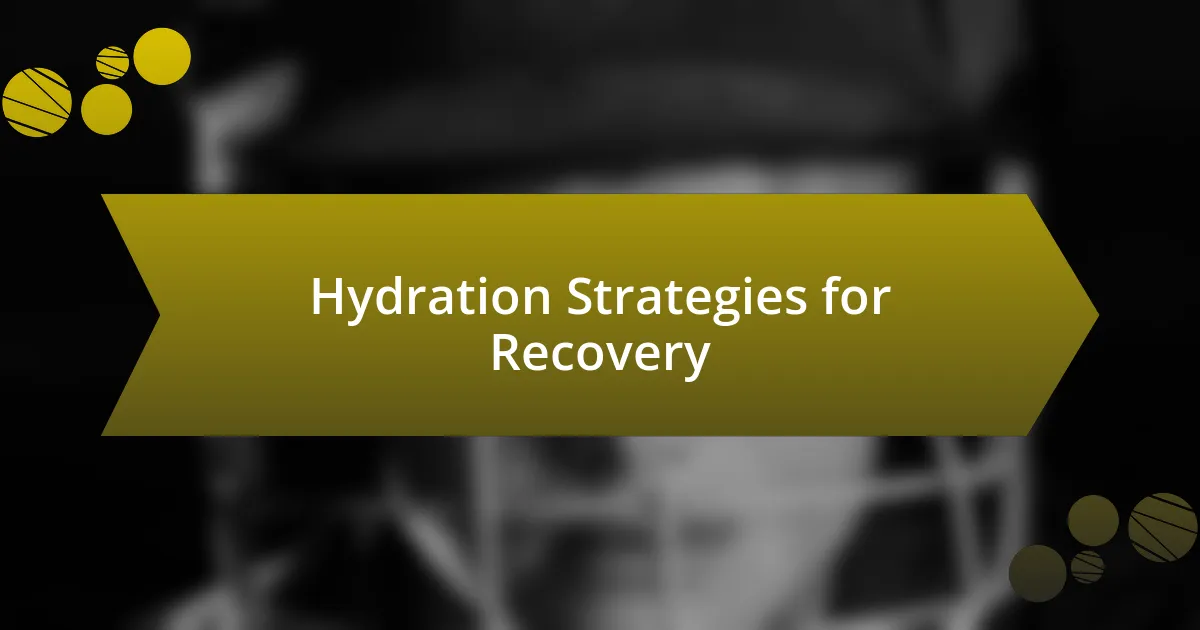
Hydration Strategies for Recovery
Hydration is a crucial aspect of recovery that often gets overlooked. I remember one particularly grueling workout when I neglected to drink enough water afterward. I felt fatigued and sluggish for days, which made me realize just how essential it is to stay hydrated. It felt like a lightbulb moment—hydration isn’t just a post-workout ritual; it’s a fundamental part of my recovery strategy.
In my experience, I’ve found that incorporating electrolyte-rich beverages right after intense exercise does wonders for my recovery. One day, after a long run, I opted for a coconut water instead of plain water and felt the difference. The natural electrolytes boosted my energy levels and helped ease muscle soreness. It’s amazing how the right hydration can speed up my recovery journey. Have you ever experimented with different hydration options?
I like to keep a reusable water bottle handy throughout the day. It’s a simple way to remind myself to drink regularly, especially during those busy hours. I often fill it with infused water, adding fruits like lemon or berries for a refreshing twist. It not only keeps me hydrated but also makes the process enjoyable. How do you ensure you’re drinking enough? For me, little strategies like this turn hydration into something I look forward to rather than a chore.
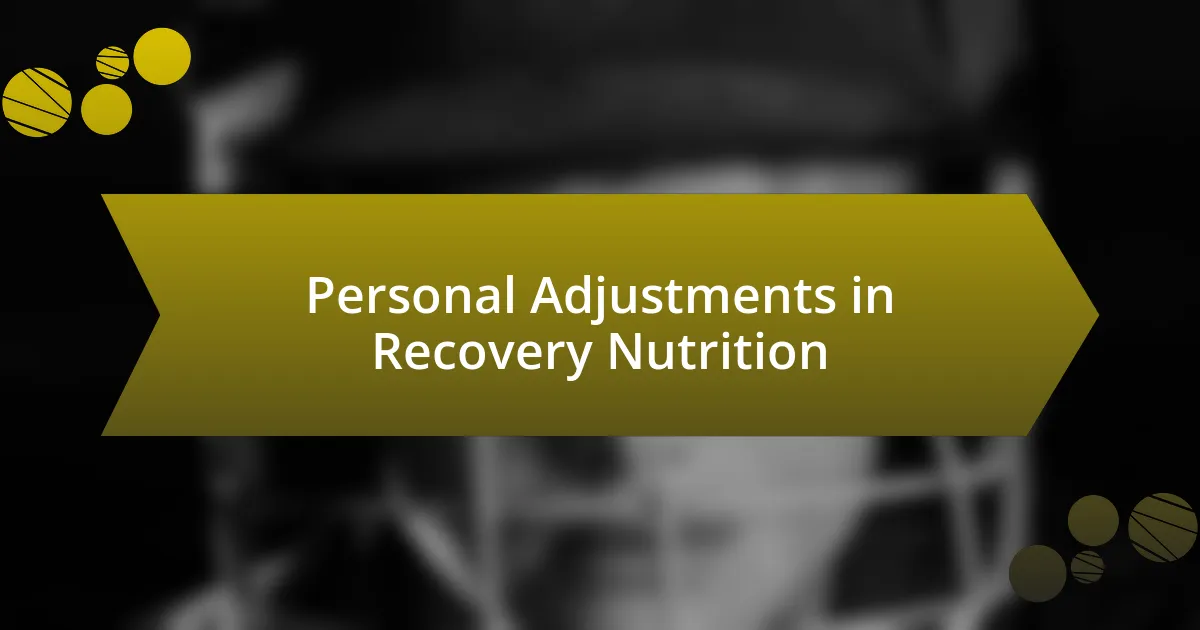
Personal Adjustments in Recovery Nutrition
Finding the right balance of macronutrients has been a significant adjustment in my recovery nutrition. I used to focus solely on protein post-workout, thinking that it was the magic bullet for recovery. However, after experimenting with my meals, I realized that incorporating healthy fats and carbohydrates made a world of difference. The moment I added more carbs after my workouts, it felt like my energy levels surged, allowing me to bounce back faster. Have you tried adjusting your macronutrient ratios?
I’ve also learned to listen to my body’s cravings more intently throughout my recovery process. There was a week when I craved a lot of fruits, and instead of questioning it, I embraced it. The natural sugars and vitamins not only satisfied my hunger, but they also provided me with a refreshingly light boost that I didn’t know I needed. It’s fascinating how our bodies communicate what they require if we just take a moment to pay attention. Do you ever wonder what your cravings might be telling you?
Meal timing has become another key adjustment for me in my recovery nutrition. It was hard at first to plan snacks and meals around my exercise schedule, but I quickly discovered the benefits of eating smaller, more frequent meals. There was a time when I felt drained post-workout because I waited too long to eat. Now, I make it a priority to refuel within an hour of exercising, and I can genuinely say it’s transformed my recovery experience. How do you prioritize your meals around your workouts? It’s such a small change but can have a huge impact on how I feel overall.

Lessons Learned and Future Goals
Through my journey in recovery nutrition, I’ve learned that flexibility is crucial. Early on, I was rigid about my meal plans, thinking that strict adherence was the key to my success. However, there were days when my body craved something different, and forcing myself to stick to the plan only led to frustration. Now, I’ve embraced the notion that it’s alright to adjust my meals based on how I feel each day. Have you ever found that a little spontaneity in your diet has brightened your perspective?
Another lesson I’ve absorbed is the importance of community support in recovery nutrition. When I started sharing my experiences with friends and family, I discovered a wealth of advice and insights that I hadn’t considered before. For instance, a friend recommended meal-prepping together, which not only made eating healthy easier but also turned it into a fun social activity. It’s remarkable how sharing this journey can lead to unexpected discoveries and motivate each other. Have you sought support from those around you?
Looking towards the future, my goal is to continue discovering new foods and recipes that align with my recovery journey. I recently stumbled upon plant-based alternatives for my favorite dishes, and experimenting with these ingredients has been thrilling. There’s so much to explore, and I can sense that each new flavor brings me closer to an even healthier lifestyle. What culinary adventures do you have on your horizon? I believe these explorations will not only enhance my nutrition but also make the process enjoyable and sustainable.













